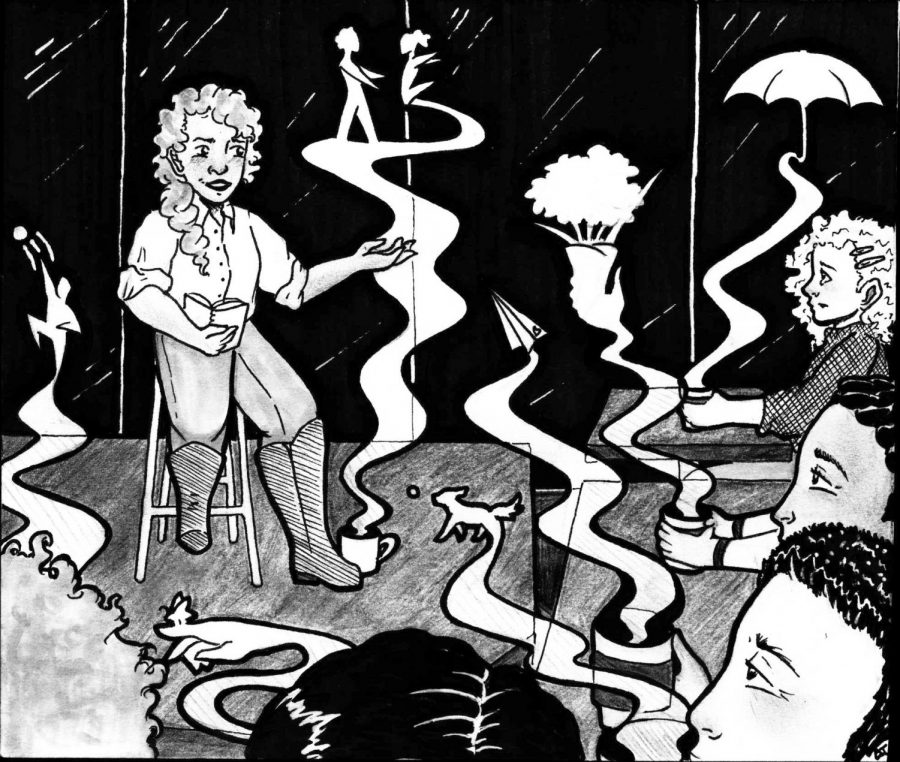Slow Train Storytellers: Bringing Oral Storytelling to Oberlin
Slow Train Storytellers will bring members of the Oberlin community together to share their stories over coffee this Friday from 7–9 p.m. Limited to five unscripted minutes, community members are encouraged to share their personal stories in a safe and supportive environment.
As a new feature of our artistic community, Storytellers has been meeting on the first and third Friday of each month since October. The Storytellers night was inspired by The Moth, a global spoken-word community in which brief, unscripted stories centered around a theme of the night are told live on air. After listening to the Moth Radio Hour for years, Storytellers Founder Kelly Garritt Waite decided to bring this spoken-word magic to Oberlin.
Waite explained that she had a two-fold intention when creating the group.
“I’ve always found kind of a gap in the [Oberlin] community for writers and storytellers,” she said. “I wanted to create a space for people who are not necessarily tied to the College to tell their stories, and more important than that, I wanted to bring together town and gown.”
While Waite has been crafting stories through the written word since a young age, she explained that oral storytelling is a vastly different genre. It can be easy to overlook the value of storytelling in Oberlin’s fast-paced environment, which perhaps overlooks the authenticity of oral stories in favor of written academic work. Storytellers night is attempting to change this focus and integrate the College and greater Oberlin community.
With the intention of enhancing the town and gown relationship, Waite’s Storytellers has seen a turnout of mostly community members aside from one College student who shared a story last Friday.
While increasing College participation is certainly a future goal, stories from community members have proved to be humorous, healing, and intriguing. Corrie Purcell, a College third-year and current employee at Slow Train Cafe, enjoyed listening to the stories during her shift.
“There was one person who wasn’t planning on telling a story (he was in town for a concert, a violinist) and he was so charming and ended up telling a hilarious story,” Purcell wrote in an email to the Review.
If you’re not there for the laughs, Waite explained that the personal stories can also prove to be very cathartic.
“I have definitely seen people experiencing healing,” Waite said. “When someone is telling a personal story, you definitely see healing going on.”
Since the theme for the events is always changing and open to interpretation, you are bound to end up with some interesting anecdotes.
“I think one of my favorite stories was told by a woman from Canada,” Waite said. “She was talking about the time she used a penis bone to chase off someone who was robbing her. Apparently in animals, this [bone] is a thing, and it was quite large.”
Looking forward to this evening’s event, College first-year Mariah Leontopoulou-Cochran is planning to share her own interpretation of “revolution.” Leontopoulou-Cochran is eager to utilize the event to better understand her community.
“Every other outlet for storytelling is directed by the College and solely for students, so I’m looking forward to interacting with Oberlin’s broader community,” she said. Leontopoulou-Cochran shares the series’ sentiment that there is power in bringing people together through their stories.
“Being intentional with what you share, because of the five-minute limit, makes it a more meaningful experience for both the performer and the listener,” she said.
Intentionally designed to foster healing and community connection, Storytellers will continue to uplift the Oberlin community and College campus during all of their gatherings still to come.
“We’re all humans,” Waite said. “We all have stories. We all have baggage.”
In providing a space to share your own personal experience, Storytellers’ continuation of the oral tradition may be just about as human as it gets.











